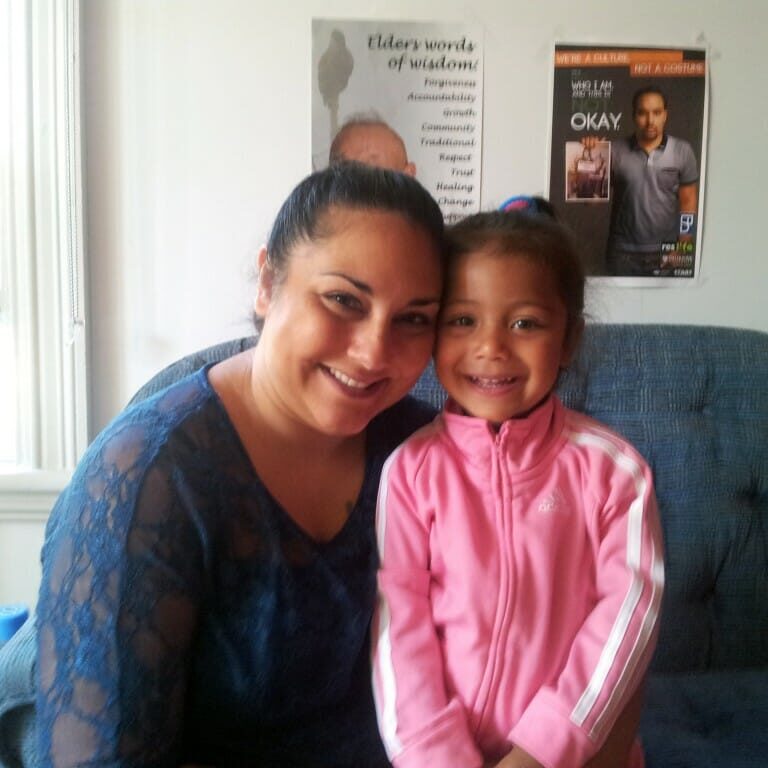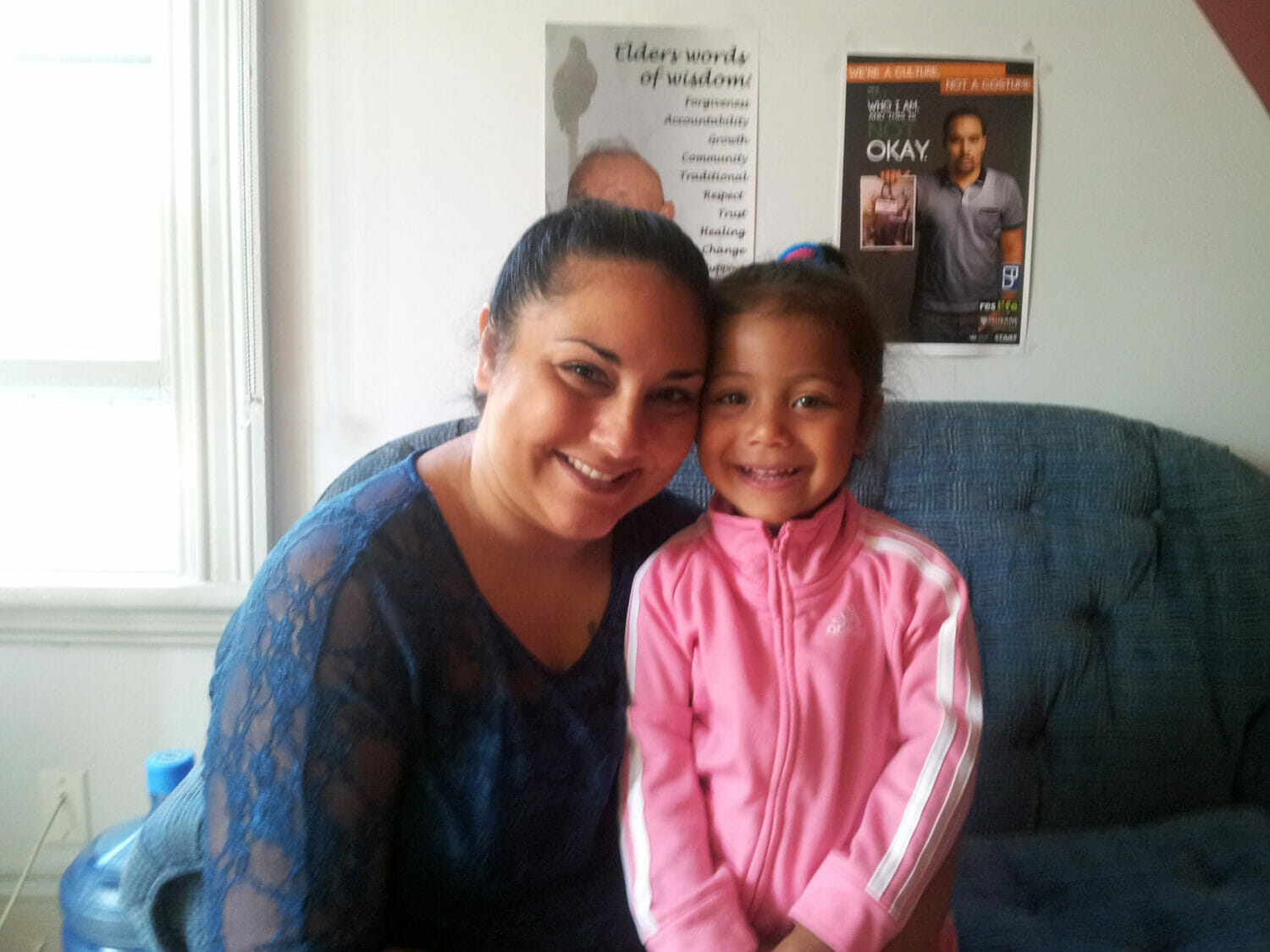

Lisa and daughter Jurni Robinson, age 3, at the Native Education Counselling Unit (photo by Kristie Smith)
Little known to much of the student body, Dalhousie University is located in the heart of traditional Mi’kmaq territory but has until now only had a few classes on First Nations peoples.
Despite current budget cuts, Dal is in the early phases of introducing a new minor in Aboriginal Studies, with a tentative start date of fall 2015. The university has hired a part-time curriculum director to research what is needed for the minor, and a complete proposal is expected this spring.
Funding the research
In the final year of a 17-year term, former Dal president Tom Traves set aside funding in his strategic plan for the purposefully vague goal of “academic innovation.” DALVision has funded events inside and outside the classroom and is being used to fund research for the Aboriginal Studies minor.
“You could think of it as a grant, but it’s not an external grant. Rather, it’s internal from the university,” explained Fiona Black, associate vice-president academic. “The academic innovation fund is managed by the provost’s office because academic innovation was, and still is, one of the strategic areas of focus coming from the president’s office.”
A committee has been formed that includes associate deans from Management and Health Professions, professors and researchers studying indigenous issues and an aboriginal alumnus.
At least three Dal students are on the committee, two undergraduates and one PhD. The committee tries to meet at least once a month.
“Things that have come up so far include an intro class because some people don’t know the basics,” explains Lisa Robinson, the researcher hired to draft the minor.
“We don’t want to assume what people know but make sure that the basics are covered. What is a treaty? Status, what does that mean? Rights and their basic history. Then there might be courses on residential schools, ceremonies, but it’s all very early still.”
Figuring out the plan
Robinson, who was hired this summer, is currently working on her masters in sociology at Dal. She’s spent the better part of the semester researching similar programs across Canada.
“I’m going to attend a conference on the Nov. 1 weekend by the Canadian Association of University Teachers. They’re holding a conference with aboriginal scholars, so I’ll be attending that. I’m hoping to do a lot of networking there, with a lot of academics from all over Canada, and while I’m there I’ll also be visiting the program at Trent (University).”
Robinson is hoping to start student consultations sometime this month. She’s looking for input from native and non-native students, as well as community members.
“Everybody that I’ve talked to is really excited for it,” says Michelle Bernard, aboriginal students’ representative for the Dalhousie Student Union, “and they think that it should have been done a long time ago. A lot of us are happy that it’s coming but we’re disappointed that we’ll be graduated and won’t be able to do the minor.”
Sara Swasson, the native post-secondary liaison, has had good experiences with the aboriginal classes already offered at Dal and hopes they keep the courses based in the community.
“In Intro to Aboriginal Health I’ve heard good things because they brought in an elder for smudging, so they brought in the traditional ceremonies that aboriginal people practice. They brought the students to a sweat, so it’s a lot of the hands-on kind of things, and they had a hand drummer come into the class. So they not only have the course content but they have the aboriginal people coming in.”
Robinson has her own ideas of what she would like to have seen when she did her undergrad at Dal, but wants to hear from incoming students as and alumni on their experiences.
“I would have loved to have seen an actual Faculty in Aboriginal Studies. When I came to Dal, I think six years ago, back then there wasn’t a lot of classes that were available. It was very slim pickings when it came to finding anything with an aboriginal context, so it would have been nice to have more variety. There’s a lot of First Nations students that come to Dalhousie and it would be nice to show them that this is what we’re doing.”
“There needs to be reaching out to the community members, reaching out to the students who want to be a part of this thing,” says Swasson.
Hoops left to jump through
Black says the DALVision funding was specifically designated to researching the minor, not implementing it.
“The funding is for what was proposed and that was for the development phase. They may want to come back in the future, saying ‘We really feel we’ve got this strong minor now, we’re ready to have it approved through Senate, now we want to request funding from some other pot.’ It wouldn’t necessarily be from the same fund, but it possibly could be.”
The proposal, which confirmed funding last year in order to hire a researcher, is tentatively slated for this spring. If that deadline can’t be met, however, all is not lost.
“Some of the academic innovation projects are running already now and some will take a couple of years to actually develop and be up,” says Black.
“One of the goals with this funding was to be as flexible as possible, so we’ve said the funding can be expanded over three years because we totally recognize that some things are not necessarily in the control of the people developing these ideas.”
If the committee reviews the proposal and finds it to be ready to go without any further drafting, they can prepare it for the Senate.
The minor will need to explore the areas Dal is currently ill-equipped for, including courses current faculty wouldn’t be able to properly cover.
“Because we are on Mi’kmaq territory, I think courses that focus on Mi’kmaq history and Mi’kmaq language should be included,” suggested Swasson. “My worry is that if we go to all these other universities to see what their native studies are, it’s going to be different than what I think that we would need, because we’re a Mi’kmaq people.”
Robinson isn’t sure if the minor will be broadly indigenous or have explicitly Mi’kmaq courses, but will have a better idea after Christmas. She intends to tap into the resource of Mi’kmaq scholars in Nova Scotia, which would influence the scope of the courses available, but she is still early on in her research.
Her goal is to have the minor ready to pursue the moment it can be, and if possible to bring the starting date to next September rather than waiting another year.
“There are so many other disciplines in school for other cultures and groups of people and it’s just so odd that there’s nothing that was really put there for our aboriginal people,” says Robinson.
“It just doesn’t make sense why there hasn’t been a program up until now, or any work on one.”






